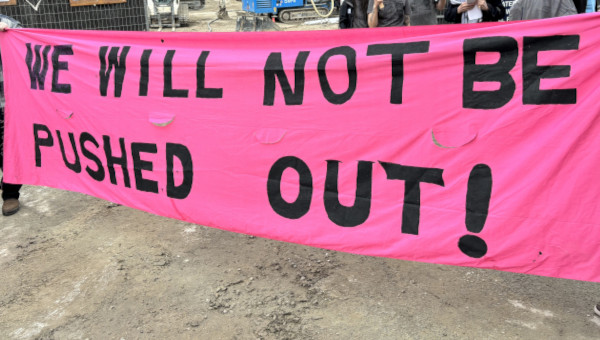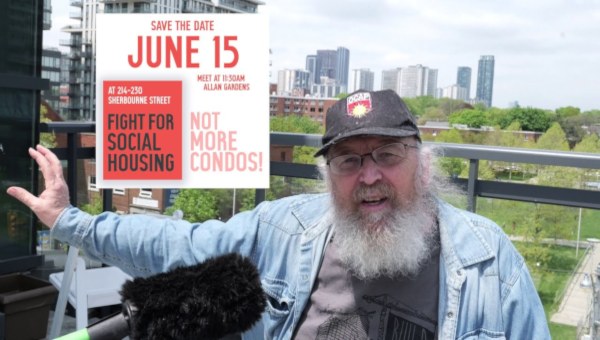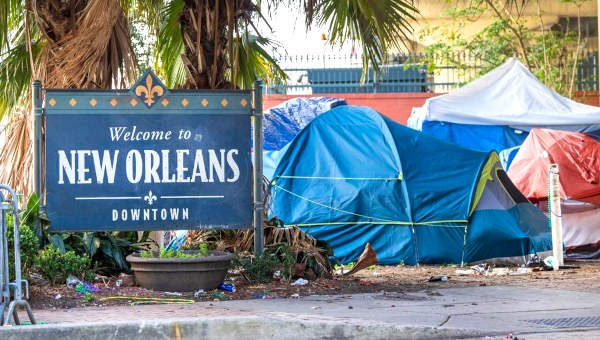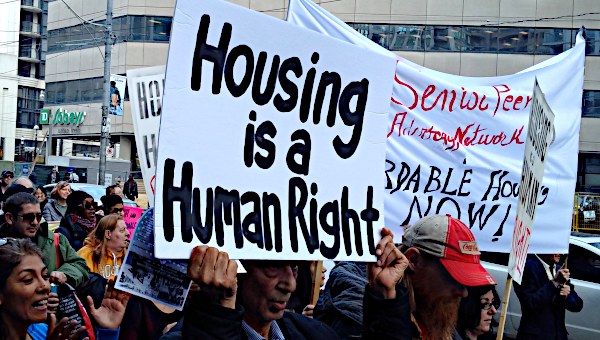How KingSett Capital Hijacked Toronto’s Revitalization Plans
In March of 2021, Toronto’s City Council directed staff to find funding sources for the purchase or expropriation of 214-230 Sherbourne Street to build “deeply affordable and supportive housing” as part of their revitalizing plans for the Downtown East. By June of 2022, the city had abandoned their plans to acquire the properties. What happened?
214-230 Sherbourne is located in one of Toronto’s oldest working-class neighbourhoods. It is at the epicentre of the city’s housing crisis in the heart of the city’s ‘skid row’. The neighbourhood is also home to Canada’s largest men’s hostel. However, the area has been undergoing gentrification since the mid 1960s, and many of the old rooming houses have disappeared. In 1986 and during the following decade, the Teneja family purchased three rooming houses located at 214-230 Sherbourne. They paid a total of $865,000 for the properties. By 2008, all three rooming houses had been boarded up, and two of the homes were later demolished while the third home, an old Victorian house that had operated as a rooming house as far back as 1911, remains boarded up but was saved due to its historical heritage. It would take another fourteen years before the Tenejas would cash in on their acquisition of the derelict properties.
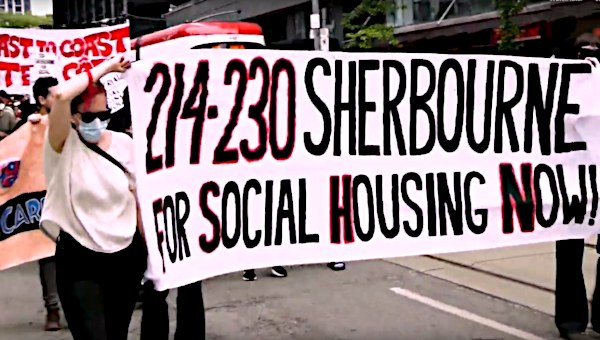
Brief History of the City’s Five-Year Revitalization Plan
Back in 2018, the City of Toronto began to work on its 5-year plan to revitalize the Dundas and Sherbourne neighbourhood. The goal of the project was to “improve housing conditions within the existing Dundas-Sherbourne neighbourhood.” At the heart of the plan was the redevelopment of Dan Harrison, a housing complex consisting of 370 units of social housing owned by the city, and the acquisition of 214-230 Sherbourne, which was privately owned. A 2019 city report highlights the importance of acquiring 214-230 Sherbourne to the implementation of the city’s plans. The report states:
“The 214-230 Sherbourne Street site provides a strategic opportunity to acquire property for the development of much-needed affordable and supportive housing. The development of the site also presents the unique opportunity to unlock the new housing and community revitalization solutions that are to address the social, economic, and physical challenges facing the Dan Harrison complex and local neighbourhood.”
The strategic importance of the acquisition of 214-230 Sherbourne is again mentioned in a city report released in the early winter of 2022. In the report, staff are directed to “review the feasibility of leveraging 214-230 Sherbourne Street property with the intention to achieve the Dan Harrison and Housing Now objectives.” It is clearly evident from these reports that up until March of 2022 the acquisition of 214-230 Sherbourne remained a central component of the city’s plans to revitalize the Dundas and Sherbourne neighbourhood.
City of Toronto Attempts to Purchase Properties But Refuses to Expropriate
The Ontario Coalition Against Poverty (OCAP) began a campaign in 2013 calling on the city to expropriate the Teneja’s properties on order to build much needed social housing in the area. When the owners of the properties quietly put 214-230 Sherbourne up for sale in 2018, the city attempted to negotiate with the family, but they refused to sell the land to the city and subsequently took the properties off the market. By then, the city had already identified the acquisition of 214-230 Sherbourne as a key strategic component of their revitalization action plan for the neighbourbood. In March of 2022, the Tenejas hired Colliers Canada to help them sell the properties, and perspective buyers were invited to bid on the site. Despite the fact that city staff had been directed by city council back in 2018 to purchase the properties if or when they came up for sale again, city staff appeared to be reluctant to bid for the properties. The city, however, subsequently did bid on the properties but were out-bid by KingSett Capital, a major developer who was buying up properties in the downtown core. When the news came out that the city had been outbid, advocates questioned whether or not the city was actually serious in their attempts to acquire 214-230 Sherbourne.
On April 6, 2022, Kristyn Wong-Tam, then local councillor for the ward, tabled a motion at a City Council meeting that called on “the Chief Officer, Create TO, to initiate expropriation of 214 to 230 Sherbourne Street to support the City-building efforts of building more affordable housing,” as previously identified in the city’s revitalization plans. Mayor John Tory and 20 city councillors voted against the expropriation of the properties, while only five councillors voted in favour. The vote confirmed that the majority of the city’s politicians had never really been serious about acquiring 214-230 Sherbourne.
KingSett Capital’s Bid Hijacks City’s Revitalization Plans for the Area
KingSett Capital, a large Canadian private equity firm with a $19-billion portfolio, paid an outrageous amount of money to the Tenejas for 214-230 Sherbourne: $53-million to be exact. It was impossible for Jon Love, CEO of KingSett Capital, not to have been aware that the city’s revitalizing plans for the Dundas and Sherburne area included the Teneja’s properties. There had been a decade-long public battle by advocates and the community demanding that the city purchase the properties, and there was extensive media coverage when the city finally announced it was bidding for them. Why, then, would KingSett bid against the city?
Furthermore, the city had an ongoing business relationship with KingSett. In April of 2021, the city purchased 877 Yonge Street for $72.35-million. The property was listed at the time as being owned by Ashkenazy Acquisition and KingSett Capital. The owner of Ashkenazy Acquisition is Ben Ashkenazy, a billionaire real estate developer based in New York. Ashkenazy Acquisition paid $4.2-million for the property in 2007, and in May 2019, they transferred ownership of the property to KingSett Capital for $2. According to the Toronto Sun, the city had paid close to four times the market value for the property. 877 Yonge had been home to more than 150 seniors up until the summer of 2019 when they were informed that they had to move out by the end of the year. A year and half later, when the KingSett and Ashkenazy’s plans for the property fell through, the city bailed them out and purchased the building. 877 Yonge now houses low-income individuals.
In the fall of 2021, the city gave KingSett the contract to redevelop a city-owned property at 705 Warden Avenue located in the east end of the city. KingSett’s business relationship with the city, however, did not deter KingSett from bidding against the city in March 2022.
230 Fightback Revives Fight to Expropriate 214-230 Sherbourne
When advocates got wind in the fall of 2022 that KingSett was planning to build a 47-story condo tower on the old Teneja properties, a group of ex-OCAP members formed 230 Fightback to organize against KingSett’s proposal. It was clear that KingSett had no intention of working with the city whose revitalization action plan had called for the construction of social housing on the site. The private equity firm’s plans were more in line with other developers who had been speculating and buying up properties in the area – thereby displacing low-income people from Dundas and Sherbourne rather that housing them. Over the last decade, major development companies such as Menkes, Pemberton, and Metropia have invested billions of dollars along the Dundas Street East corridor. When confronted by members of 230 Fightback as to why KingSett had bid against the city given the city’s revitalization plans for the area, Bill Logar, KingSett’s Chief Management Asset Officer, answered, “It was for sale.”
In a meeting with local Councillor Chris Moise at the beginning of 2023, he confirmed that the city had waved a white flag regarding 214-230 Sherbourne, and Moise argued at the time that he had no intention in interfering with KingSett’s plans. A year later, however, 230 Fightback would learn that Moise had had a change of heart. 230 Fightback continued its campaign throughout 2023 to try and stop KingSett Capital from moving forward with its plan to construct a condo tower on the contested site. 230 Fightback held community meetings and occupied the lobby of the Scotia Plaza, where KingSett’s main office is located. They picketed an event where Jon Love was giving a key note speech and in December 2023 picketed at a gala being held at the Royal York Hotel where guests paid up to $25,000 per table to honour Love, who was being given an award for Business Leader of the year.
Mayor Olivia Chow Refuses to Meet with 230 Fightback
Mayor John Tory, who had never been supportive of the city’s plans to expropriate 214-230 Sherbourne, suddenly resigned in February of 2023 after it became public that he had an affair with one of his staff. An election was held that summer to replace him. Olivia Chow, who had historic ties to the New Democratic Party (NDP), won the mayoral race. A major platform that Olivia Chow ran on was the need for more affordable housing. 230 Fightback contacted the mayor’s office soon after Mayor Chow was elected to arrange for a meeting to seek her support for 230 Fightback’s campaign calling on the city to begin negotiations with KingSett to purchase 214-230 Sherboune.
Mayor Chow and her office ignored 230 Fightback numerous requests for a meeting throughout that summer and fall. 230 Fightback wrote several open letters to Mayor Chow during this period, calling on her to meet with them and asking her to take a public position opposing KingSett’s plans. Things came to a head on January 25, 2024, when members of 230 Fightback and their allies occupied the lobby in front of the mayor’s office refusing to leave until they got a meeting. After a 3-hour standoff, two of the mayor’s staff agreed to meet with a small delegation.
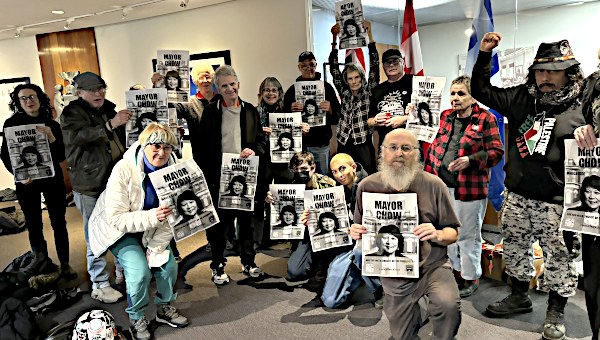
KingSett Offers to Sell 214-230 Sherbourne to the City
Several months prior to the occupation, 230 Fightback had received an important email from Bill Logar. In his December 6th email, Logar informed 230 Fightback that KingSett had offered to sell 214-230 Sherbourne to the city and were “patiently waiting for a response.” Although 230 Fightback had been hearing rumors that the city had been approached by KingSett, the rumors had not yet been totally confirmed. The day after receiving Logar’s email, 230 Fightback marched down to the mayor’s office and hand delivered a copy of the email to her staff. In the new year, 230 Fightback wrote Mayor Chow, informing her office that 230 Fightback would be coming to city hall on January 25 to discuss KingSett’s email.
On the morning of January 25, a few hours before the occupation began, 230 Fightback received another interesting email, this time from Moise’s office who wanted to inform 230 Fightback that Moise and the mayor’s office had been in negotiations with KingSett regarding the purchase of 214-230 Sherbourne since the summer. When the delegation finally met with the mayor’s staff that afternoon, it further learned that KingSett’s plans to build a 47-story condo on the site had been derailed due to a new by-law being introduced by the province which would protect the air space of helicopters flying to downtown hospitals.
City and Kingsett Can’t Agree on a Price
Although Logar, Moise, and the mayor’s office offered very few details regarding the ongoing negotiations between the city and Kingsett, a number of facts became evident. Logar’s email in December 2023 made it clear that their plans for 214-230 Sherbourne had changed. Logar explained that KingSett was willing to sell the properties to the city but only if they were able to recoup the $53-million they paid for the properties and the costs they had incurred since the purchase – which amounted to close to $6-million. Moise’s office argued in their email that KingSett had made a bad business decision and overpaid for the properties and were now wanting the city to pay more than the market value for the land:
“Unfortunately, Kingsett is trying to squeeze the city for an above-market value price on the land, which is unreasonable for a cash-strapped city like Toronto… Now, they realize that they paid too much for the land and that it will not be profitable for them… I see in the letter from Bill Logar that he states their asking price only covers the costs they incurred; however, he does not mention that this cost is opportunity cost and their bad planning is not the city’s responsibility.”
At the January 25 meeting with the mayor’s office, staff confirmed that the mayor was supportive and interested in the city purchasing 214-230 Sherbourne. However, KingSett was asking more than the market value for the land. 230 Fightback was told that the mayor was not prepared to pay the high price that KingSett was asking for the properties. The city was not going to bail out their business partner this time.
Nevertheless, this did not stop the city from continuing to do business with KingSett. On January 15th, the mayor’s office announced a partnership between the city, the federal government, and KingSett regarding a new development project in the west end of the city. According to the mayor’s office, KingSett was given $9.8-million in financial incentives, while the federal government provided KingSett with $235.9-million in low-interest loans for the project. Despite all of this public money being provided to KingSett, the collaboration would result in only 15% of the 1,135 new rental units being targeted as “affordable rental housing” when completed.
214-230 Sherbourne is No Longer Officially Part of Revitalizations Plans
In December 2023, Bill Logar had written 230 Fightback that KingSett was offering to sell 214-230 Sherbourne to the city because they now “understood what this property meant to the community.” Despite these words and after more than 14 months of negotiations, no deal has yet been reached that would see construction of social housing on the site. The city is continuing to do business with KingSett, while the backdoor negotiations regarding 214-230 Sherbourne have been going nowhere. The city should refuse to do business with KingSett until an agreement is reached.
Moise’s office tried to reassure everyone concerned at the beginning of the year that Councillor Moise was supportive and had been working hard on the negotiations:
“Councillor Moise has been working on this file in the interest of the community since last February. You are absolutely right in saying that this land is a perfect opportunity for affordable housing and Councillor Moise is in complete agreement. We have been willing to negotiate with KingSett since the beginning. When Mayor Chow was elected, we started working with her and her staff on the file immediately and are in complete alignment with our shared vision to purchase the land for housing.”
Three months after sending this email, however, the city and KingSett still can’t agree on a price.
Meanwhile, KingSett has recently submitted a new application for the site to address concerns about the flight path of helicopters flying to downtown hospitals. The new application submitted to city planners on February 21, 2024, includes a reduction in height of the condo tower from 47 stories to 46 stories. KingSett also submitted a supplementary document from an aviation expert who concluded that “the architectural plans for the project at 214-230 Sherbourne Street indicate that there will be vertical or lateral clearances from the helicopter flight paths” to St. Michael’s hospital and Sick Kids Hospital.
The Cost of Not Reaching a Deal
This summer will mark the 16th anniversary since 214-230 Sherbourne last housed low-income people. Plans to build social housing on the properties have now been officially abandoned despite the city’s claim of ongoing negotiations with KingSett. The properties are no longer listed as part of the city’s revitalization plans for Dundas and Sherbourne. Who is to blame? Was it the Teneja family who refused to sell 214-230 to the city back in 2018? Was it City Council who refused to expropriate the properties? Is it KingSett’s greed and the unreasonable amount of money they are asking the city to pay for 214-230 Sherbourne? Did KingSett not understand the implication of their actions when they outbid the city? Why does the city continue to do business with KingSett? Are city politicians really sincere when they say that they want social housing at 214-230 Sherbourne?
When KingSett bid against the city in March of 2022, they literally hijacked the city’s revitalizations plans for Dundas and Sherbourne without any concern for the harm it would cause. The city continues to move forward with the revitalization of Dundas and Sherbourne and their plans to redevelop Dan Harrison, but the acquisition of 214-230 Sherbourne is no longer part of the city’s official plans. The city’s backdoor negotiations with KingSett have now dragged on for months and months. The lack of urgency on the part of both the city and KingSett in reaching a deal is unacceptable. Despite claiming to now understand “how important 214-230 Sherbourne is to the community,” KingSett continues to move forward with its plans to build a condo on the site while negotiations are supposedly going on with the city.
When calculating the price that they are willing to pay for 214-230 Sherbourne, the city should not only consider the monetary cost but must also consider the cost of failing to secure the construction of social housing on the site. The lives affected and the devastation caused by Toronto’s housing crisis are impossible to ignore at Dundas and Sherbourne, and city politicians have a moral obligation to address the destitution that people in the neighbourhood experience on a daily basis.
The fight for social housing and the future of 214-230 Sherbourne, however, remains in the hands of the advocates and community members who continue to organize and mobilize to expose how one of the city’s business partners and major developers hijacked the city’s plans to build social housing at 214-230 Sherbourne, thereby causing irrevocable harm. It is essential that 214-230 Sherbourne be given life again and begin to house low-income people. •


